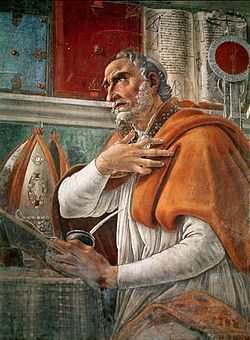
Back شفاعة القديسين Arabic ܣܢܐܓܪܘܬܐ ܕܩܕܝܫܐ ARC Přímluva svatých Czech Intercesión de los santos Spanish شفاعت قدیسان Persian Perantaraan para kudus ID 전구 (가톨릭) Korean Fanelanelanan' ny olo-masina Malagasy Perantaraan para santo Malay Wstawiennictwo świętych Polish

The intercession of saints is a doctrine that maintains that saints can intercede for others. The invocation of the saints is the practice of persons requesting saints to intercede for them;[2][3] the comprecation of saints is the practice in which Christians ask God for a share in the prayers offered by the saints.[4][5] The practice of the invocation of the saints is held by the Catholic Church, Eastern Orthodox Church, the Assyrian Church of the East, the Oriental Orthodox Churches, and some Lutherans and Anglicans (chiefly those of Evangelical Catholic or Anglo-Catholic churchmanship, respectively).[6] The Lutheran Churches and the Anglican Communion accept the doctrine of the intercession of the saints, holding that the saints (living and in heaven) pray for the Church; the practice of the comprecation of saints is accepted by these traditions, though the invocation of the saints is generally rejected by these Christian denominations (apart from certain Evangelical Catholics and Anglo-Catholics).[7][5]
To intercede is to go or come between two parties, to plead before one of them on behalf of the other. In ecclesiastical usage both words are taken in the sense of the intervention primarily of Christ, and secondarily of the Blessed Virgin Mary and the angels and saints, on behalf of men and women.[8]
The 4th-century Apostles' Creed states belief in the communion of saints, which certain churches interpret as supporting the intercession of saints. However, similar practices are controversial in Judaism and Islam. The practice of invoking saints for their intercession can be found in Catholic writings from the 3rd century onwards.[9][10][11]
- ^ On the Birthday of Saint John the Baptist, Sermon 293B:5:1. Against superstitious midsummer rituals in Augustine's Works, Sermons on the Saints, (1994), Sermons 273–305, John E. Rotelle, ed., Edmund Hill, Trans., ISBN 1-56548-060-0 ISBN 978-1-56548-060-5 p. 165. [1] Editor's comment (ibid., note 16, p. 167): "So does ‘his grace' mean John's grace? Clearly not in the ordinary understanding of such a phrase, as though John were the source of the grace. But in the sense that John's grace is the grace of being the friend of the bridegroom, and that that is the grace we are asking him to obtain for us too, yes, it does mean John's grace."[2]
- ^ "The Honor and Invocation of the Saints". Catholic Harbor of Faith and Morals. 2025. Retrieved 1 August 2025.
- ^ Heming, Carol Piper (1 August 2003). Protestants and the Cult of the Saints: in German-Speaking Europe, 1517–1531. Penn State Press. p. 91. ISBN 978-1-935503-62-0.
- ^ Stone, Darwell (1916). The Invocation of Saints. Rivington. p. 3.
A necessary preliminary to the consideration of the invocation of saints is some treatment of what is ordinarily known as the comprecation of saints. This differs from invocation in the respect that, while in invocation the words 'pray for us' or 'pray for me' are directly addressed to the saint or saints, in comprecation the request for the prayers of the saints is addressed to God.
- ^ a b Clark, James (10 June 2024). "On the Invocation of the Saints [Commentary on Browne: Article XXII (4)]". North American Anglican. Retrieved 2 August 2025.
- ^ Cite error: The named reference
ECCL2007was invoked but never defined (see the help page). - ^ Cite error: The named reference
Concordia2022was invoked but never defined (see the help page). - ^ Catholic Encyclopedia: Intercession. New Advent. Retrieved 6 November 2023.
- ^ "On the Intercession and Invocation of the Saints". orthodoxinfo.com.
- ^ "The Intercession of the Saints". Archived from the original on 2009-06-19. Retrieved 2009-09-06.
- ^ "Why do we pray for the intersession of Saints?". news.assyrianchurch.org.